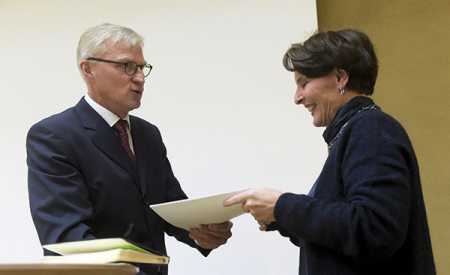|
Tue, 08 Dec, 2015 12:03:12 AM FTimes – STT Report, Dec 8  Working group Chairman Anssi Vanjoki submitted to the Minister of Transport and Communications Anne Berner in Helsinki on Monday, 7 December 2015.Photo – Lehtikuva. Consumer decisions determine the direction of development in the rapidly changing media world dominated by global competition, according to an assessment report submitted on Monday.
The final report by the working group tasked with the assessment of the Finnish media market finds that media policy is used to ensure a fair competition environment.
The working group proposes that the Finnish Broadcasting Company’s tasks and duties be specified so that its operations would better promote the functioning of Finland’s overall media market.
The Finnish National Broadcasting Company should work more extensively as a distributor and purchaser of Finnish productions. The company’s online services could be expanded into an open national content platform.
Minister of Transport and Communications, Anne Berner, on 3 August, 2015 appointed a working group to examine and assess the operating conditions, competitive positioning and obstacles of the Finnish media market.
The working group submitted its final report to Minister Berner.
It is important with regard to the functionality of the media market that common regulation and a fair competition environment prevail both nationally and internationally, according to the report.
The market functions in a way that is as free and technologically neutral as possible, the working group chair Anssi Vanjoki says.
Providing a fair operating environment is also one of the most important ways to support freedom of expression and pluralist media, as well as to maintain diverse content, Vanjoki continues.
In order to achieve technologically neutral competition, the working group proposes the dismantling of device-specific marketing regulations and the application of the same value-added tax to digital and physical media.
Additionally the working group would eliminate the supervision fee that the Finnish Communica-tions Regulatory Authority charges from enterprises with television and radio programming.
With regard to content, the working group proposes a market-driven transition to the use technology that facilitates high resolution broadcasts.
This would eliminate the must-carry obligation now imposed on commercial channels, according to the report.
The working group’s proposal for Finland’s postal service Posti is to promote innovative post de-livery models.
Additionally, the working group would invest in centralised digital news services, which could spe-cifically support the digital journalism of regional and local newspapers.
The working group also proposes a cut to media sector schooling and the remodelling of some start-ing places.
Professor Anssi Vanjoki from the Lappeenranta University of Technology acted as the working group’s chair and the members included author and columnist Kalle Isokallio, communication com-pany Kreab Oy’s CEO Mikael Jungner and freelance journlist Reetta Meriläinen.
During their work, the working group reviewed the media sector’s status on the basis of prior do-mestic and foreign sector reviews.
The group also heard from and interviewed numerous actors and impact creators in the sector, and received statements from tens of media enterprises and associations to prepare the report. The committee proposed regional and local newspapers be used in a support capacity in the development of a national digital service.
According to the committee, a digital news service would provide an excellent source of national and international news, as well as a comprehensive database of events and information.
The service's development and launch would be funded by some already existing public funds, which focus on advancing competitiveness.
The committee did not comment on the organisation of the news service, but according to chairman of the committee Anssi Vanjoki, the domestic digital news service could be modelled, for example, after STT Lehtikuva.
According to Vanjoki, it is vital for the proper functioning of the media that the media market is controlled by nationally and internationally uniform regulations and a fair competitive environment.
“The provision of a fair business environment is also one of the most important ways to support freedom of expression and a pluralistic media, as well as maintaining a wide range of content,” Vanjoki said.
More News
|
|
Finland Times
| Wednesday, 24 April, 2024 |

